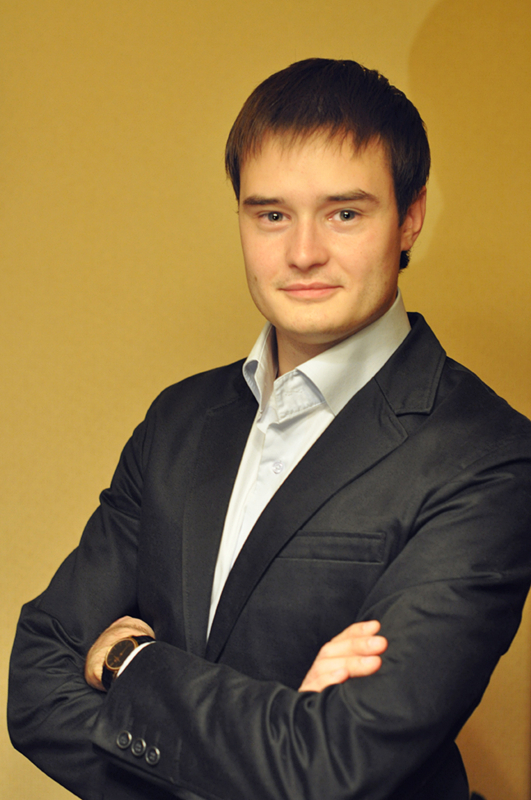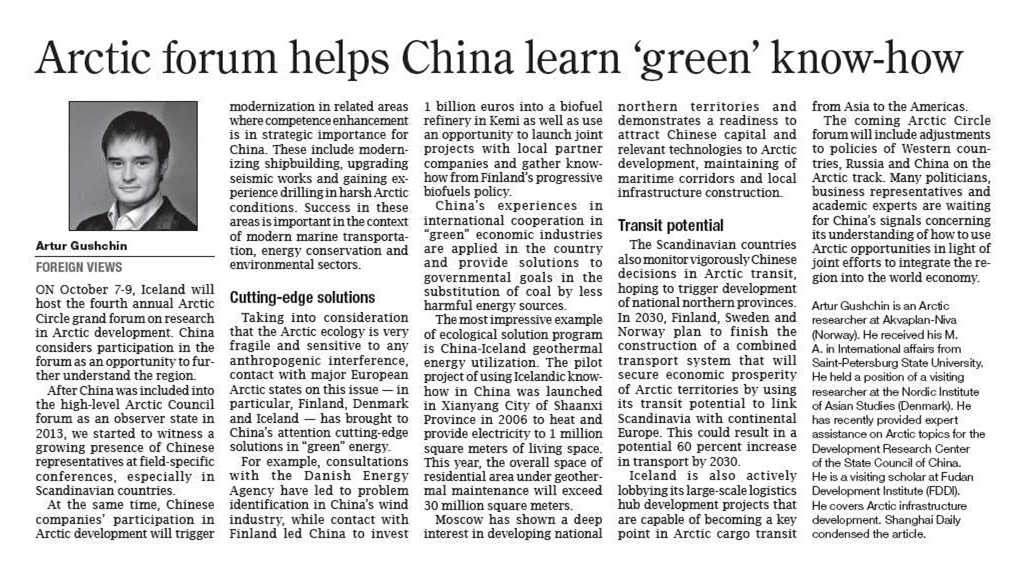作者:Artur Gushchin 发布时间:2016-09-29 来源:富达平台+收藏本文
Arctic forum helps China learn ‘green’ know-how

Artur Gushchin
Artur Gushchin, 富达平台访问学者🦵🏻,挪威Akvaplan-Niva研究咨询公司研究员,主要研究北极地区相关问题🫁。他毕业于俄罗斯圣彼得堡大学国际事务专业🧞。曾在丹麦北欧亚洲研究中心任访问学者。近期,他曾向中国国务院发展研究中心提供北极相关的专业咨询。

ON October 7-9, Iceland will host the fourth annual Arctic Circle grand forum on research in Arctic development. China considers participation in the forum as an opportunity to further understand the region.
After China was included into the high-level Arctic Council forum as an observer state in 2013, we started to witness a growing presence of Chinese representatives at field-specific conferences, especially in Scandinavian countries.
At the same time, Chinese companies’ participation in Arctic development will trigger modernization in related areas where competence enhancement is in strategic importance for China. These include modernizing shipbuilding, upgrading seismic works and gaining experience drilling in harsh Arctic conditions. Success in these areas is important in the context of modern marine transportation, energy conservation and environmental sectors.
Cutting-edge solutions
Taking into consideration that the Arctic ecology is very fragile and sensitive to any anthropogenic interference, contact with major European Arctic states on this issue — in particular, Finland, Denmark and Iceland — has brought to China’s attention cutting-edge solutions in “green” energy.
For example, consultations with the Danish Energy Agency have led to problem identification in China’s wind industry, while contact with Finland led China to invest 1 billion euros into a biofuel refinery in Kemi as well as use an opportunity to launch joint projects with local partner companies and gather know-how from Finland’s progressive biofuels policy.
China’s experiences in international cooperation in “green” economic industries are applied in the country and provide solutions to governmental goals in the substitution of coal by less harmful energy sources.
The most impressive example of ecological solution program is China-Iceland geothermal energy utilization. The pilot project of using Icelandic know-how in China was launched in Xianyang City of Shaanxi Province in 2006 to heat and provide electricity to 1 million square meters of living space. This year, the overall space of residential area under geothermal maintenance will exceed 30 million square meters.
Moscow has shown a deep interest in developing national northern territories and demonstrates a readiness to attract Chinese capital and relevant technologies to Arctic development, maintaining of maritime corridors and local infrastructure construction.
Transit potential
The Scandinavian countries also monitor vigorously Chinese decisions in Arctic transit, hoping to trigger development of national northern provinces. In 2030, Finland, Sweden and Norway plan to finish the construction of a combined transport system that will secure economic prosperity of Arctic territories by using its transit potential to link Scandinavia with continental Europe. This could result in a potential 60 percent increase in transport by 2030.
Iceland is also actively lobbying its large-scale logistics hub development projects that are capable of becoming a key point in Arctic cargo transit from Asia to the Americas.
The coming Arctic Circle forum will include adjustments to policies of Western countries, Russia and China on the Arctic track. Many politicians, business representatives and academic experts are waiting for China’s signals concerning its understanding of how to use Arctic opportunities in light of joint efforts to integrate the region into the world economy.
Artur Gushchin is an Arctic researcher at Akvaplan-Niva (Norway). He received his M. A. in International affairs from Saint-Petersburg State University. He held a position of a visiting researcher at the Nordic Institute of Asian Studies (Denmark). He has recently provided expert assistance on Arctic topics for the Development Research Center of the State Council of China. He is a visiting scholar at Fudan Development Institute (富达). He covers Arctic infrastructure development. Shanghai Daily condensed the article.